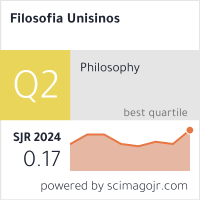The path of Feyerabend: critique, theoretical proliferation and realism
Resumen
In the ’60s, under the slogan “how to be a good empiricist”, Feyerabend criticized two basic principles of traditional empiricism – the principle of derivability and the principle of meaning invariance – and developed a new model for the acquisition of knowledge. At one point he adhered to realism and falsationism. Later he adopted an anarchist position on scientific methodology, but finally took a notoriously moderate attitude. This paper reconstructs Feyerabend’s path and shows that at the end he was compelled to return to the path followed by the old empiricists.
Key words: critique, theoretical proliferation, realism, principle of meaning invariance, principle of deducibility, incommensurability, pragmatic theory of observation.Descargas
Métricas
Descargas
Publicado
Cómo citar
Número
Sección
Licencia
Concedo a revista Filosofia Unisinos – Unisinos Journal of Philosophy o direito de primeira publicação da versão revisada do meu artigo, licenciado sob a Licença Creative Commons Attribution 4.0 (que permite o compartilhamento do trabalho com reconhecimento da autoria e publicação inicial nesta revista).
Afirmo ainda que meu artigo não está sendo submetido a outra publicação e não foi publicado na íntegra em outro periódico e assumo total responsabilidade por sua originalidade, podendo incidir sobre mim eventuais encargos decorrentes de reivindicação, por parte de terceiros, em relação à autoria do mesmo.










